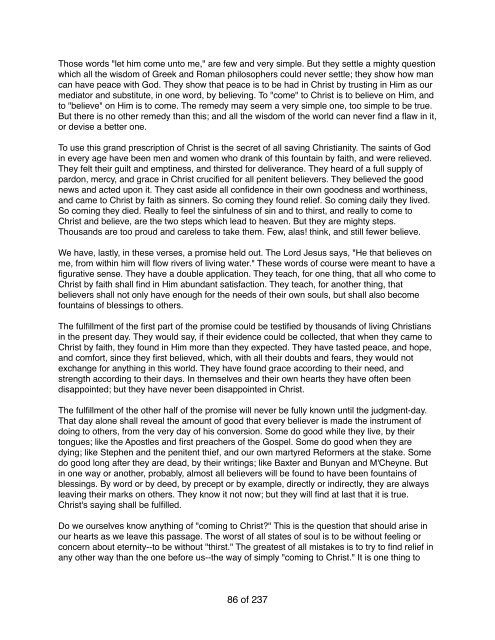J. C. Ryle John
John Charles Ryle (May 10, 1816 - June 10, 1900) was an evangelical Anglican clergyman and first Bishop of Liverpool. He was renowned for his powerful preaching and extensive tracts.
John Charles Ryle (May 10, 1816 - June 10, 1900) was an evangelical Anglican clergyman and first Bishop of Liverpool. He was renowned for his powerful preaching and extensive tracts.
You also want an ePaper? Increase the reach of your titles
YUMPU automatically turns print PDFs into web optimized ePapers that Google loves.
Those words "let him come unto me," are few and very simple. But they settle a mighty question<br />
which all the wisdom of Greek and Roman philosophers could never settle; they show how man<br />
can have peace with God. They show that peace is to be had in Christ by trusting in Him as our<br />
mediator and substitute, in one word, by believing. To "come" to Christ is to believe on Him, and<br />
to "believe" on Him is to come. The remedy may seem a very simple one, too simple to be true.<br />
But there is no other remedy than this; and all the wisdom of the world can never find a flaw in it,<br />
or devise a better one.<br />
To use this grand prescription of Christ is the secret of all saving Christianity. The saints of God<br />
in every age have been men and women who drank of this fountain by faith, and were relieved.<br />
They felt their guilt and emptiness, and thirsted for deliverance. They heard of a full supply of<br />
pardon, mercy, and grace in Christ crucified for all penitent believers. They believed the good<br />
news and acted upon it. They cast aside all confidence in their own goodness and worthiness,<br />
and came to Christ by faith as sinners. So coming they found relief. So coming daily they lived.<br />
So coming they died. Really to feel the sinfulness of sin and to thirst, and really to come to<br />
Christ and believe, are the two steps which lead to heaven. But they are mighty steps.<br />
Thousands are too proud and careless to take them. Few, alas! think, and still fewer believe.<br />
We have, lastly, in these verses, a promise held out. The Lord Jesus says, "He that believes on<br />
me, from within him will flow rivers of living water." These words of course were meant to have a<br />
figurative sense. They have a double application. They teach, for one thing, that all who come to<br />
Christ by faith shall find in Him abundant satisfaction. They teach, for another thing, that<br />
believers shall not only have enough for the needs of their own souls, but shall also become<br />
fountains of blessings to others.<br />
The fulfillment of the first part of the promise could be testified by thousands of living Christians<br />
in the present day. They would say, if their evidence could be collected, that when they came to<br />
Christ by faith, they found in Him more than they expected. They have tasted peace, and hope,<br />
and comfort, since they first believed, which, with all their doubts and fears, they would not<br />
exchange for anything in this world. They have found grace according to their need, and<br />
strength according to their days. In themselves and their own hearts they have often been<br />
disappointed; but they have never been disappointed in Christ.<br />
The fulfillment of the other half of the promise will never be fully known until the judgment-day.<br />
That day alone shall reveal the amount of good that every believer is made the instrument of<br />
doing to others, from the very day of his conversion. Some do good while they live, by their<br />
tongues; like the Apostles and first preachers of the Gospel. Some do good when they are<br />
dying; like Stephen and the penitent thief, and our own martyred Reformers at the stake. Some<br />
do good long after they are dead, by their writings; like Baxter and Bunyan and M'Cheyne. But<br />
in one way or another, probably, almost all believers will be found to have been fountains of<br />
blessings. By word or by deed, by precept or by example, directly or indirectly, they are always<br />
leaving their marks on others. They know it not now; but they will find at last that it is true.<br />
Christ's saying shall be fulfilled.<br />
Do we ourselves know anything of "coming to Christ?" This is the question that should arise in<br />
our hearts as we leave this passage. The worst of all states of soul is to be without feeling or<br />
concern about eternity--to be without "thirst." The greatest of all mistakes is to try to find relief in<br />
any other way than the one before us--the way of simply "coming to Christ." It is one thing to<br />
86 of 237




